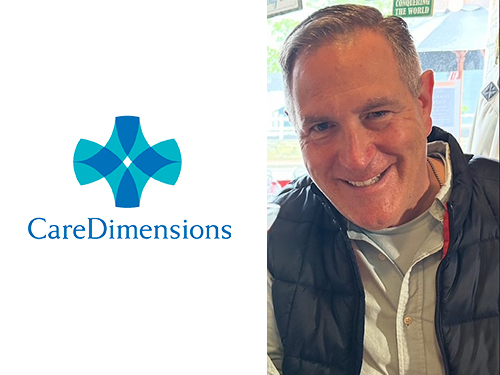How can we help?
888-283-1722
Call us now at 888-283-1722
24/7 Referrals and Nursing Support
Voices of Care Blog

A Caregiver's Story: What I Learned About Palliative Care
Posted on July 23, 2019 by Davita NowlandEarly one morning in 2017, my husband Don fell in our bedroom.
A decade earlier, Don had been diagnosed with a rare, slow-growing form of gastrointestinal cancer for which there was no cure.
After his diagnosis, we set out to enjoy the time we still had to spend with each other and with our family and friends. Don’s cancer remained manageable for quite some time, and he had a good quality of life. Then, in 2015, his cancer became more active.
When he fell, I knew he was in the end stages of his disease. I couldn’t help him to get back up, so I called 9-1-1, and the ambulance transported Don to our local hospital emergency department. There, the providers found a massive abdominal infection, and he was transferred to that same hospital’s Intensive Care Unit (ICU) for aggressive lifesaving treatment.
Making the end-of-life decision
In the ICU, Don’s condition continued to deteriorate. After three days, in my stressed and sleep-deprived state, I needed to make the right decision to minimize my beloved husband’s suffering.
I asked his nurse if it was the right time to discuss hospice. She confirmed that it was, and we awaited the arrival of the hospice coordinator.
Since his diagnosis, Don had been in the care of an excellent oncology team at Dana Farber Cancer Institute in Boston. He also had a visiting nurse. Yet, in that local hospital, I never felt so insecure and out of control and alone.
Palliative care for patients with advanced illness
Now, two years on, I realize that I didn’t have to be alone, and that there was a better approach.
Long before Don’s fall and emergency hospital admission, I had, in fact, made contact with Care Dimensions’ Palliative Care Team. We thought we knew how palliative care worked, but in hindsight, I didn’t understand it fully.
Now I know that the Care Dimensions team could have collaborated with his medical oncology team to participate in pain management and quality-of-life needs. Also, if we had engaged them earlier, the palliative care experts would have been able to help us recognize when we had reached a critical juncture in his condition and to plan next steps.
What my story means for other caregivers and families
From the hospital’s ICU, Don was transferred to the Care Dimensions Kaplan Family Hospice House where he received compassionate inpatient care and services. This allowed us to find peace, and for this I’m grateful.
He died at The Kaplan House just before his 74th birthday and our 22nd wedding anniversary.
Looking back, I know that there are things that I could have done differently to make Don’s final days better for both of us and to help us to feel less afraid and out of control.
Mostly, I have learned that, before those critical moments, it’s important for caregivers to have the difficult conversations about a care and contingency plan. A palliative care team can help us with these conversations—while also helping us to manage our loved one’s complex symptoms, and collaborate with the medical team for a better quality or end of life.
3 things I’ve learned about end-of-life and palliative care:
1.Talk palliative care: The time to discuss and plan for palliative and hospice care is at the diagnosis - with the understanding that it’s not just for the patient, but also for the family and caregivers.
2.Plan: Discuss, draft and agree on an end-of-life care plan that includes and honors the patient’s wishes.
3.Communicate: Make sure everyone understands the patient’s wishes so you will have a path to follow and you know how you will manage your loved one’s care and needs.
Learn more about advance directives and how to start a conversation by using these tools: https://www.caredimensions.org/where-do-i-start/planning-ahead/. Or learn about our palliative care services here.
Davita Nowland is a long-time supporter of Care Dimensions. Davita delivered the remarks at our 23rd Annual Hospice Regatta Dinner Auction and our 25th Annual Hospice Regatta on June 16, 2019.
Additional Posts
Our 2025 Year-End Appeal
Posted on December 4, 2025 by Care Dimensions in DonorsThanks to supporters like you, family and friends can focus on each other while trusting that our Care Dimensions team is there to guide them. ...
Continue readingNot All Spiritual Care Involves Prayer – Sometimes It's About Popcorn
Posted on October 19, 2025 by Stephen Thompson Kohut, Spiritual Counselor in Hospice, Hospice careersNot everyone is religious, but Steve Kohut believes most people are spiritual. That's where his role as a hospice spiritual counselor comes in. ...
Continue readingA Decade of Compassionate Giving: The Nordblom Family Foundation
Posted on October 13, 2025 by Shaun Neville in DonorsThrough ten years of supporting Care Dimensions, the Nordblom Family Foundation has helped bring music, art, and pet therapy to hospice patients. ...
Continue readingAnyone—patient, family, care provider—can make a referral. Fill in the form online or call us today.
Since 1978, Care Dimensions, formerly Hospice of the North Shore, has provided comprehensive and compassionate care for individuals and families dealing with life-threatening illnesses. As the non-profit leader in advanced illness care, we offer services in over 100 communities in Massachusetts.
Copyright 2026 | Care Dimensions, 75 Sylvan Street, Suite B-102, Danvers, MA 01923 | 888-283-1722 | 978-774-7566 |
%20St_%20Pierre_Dorothy%20St.jpg)








